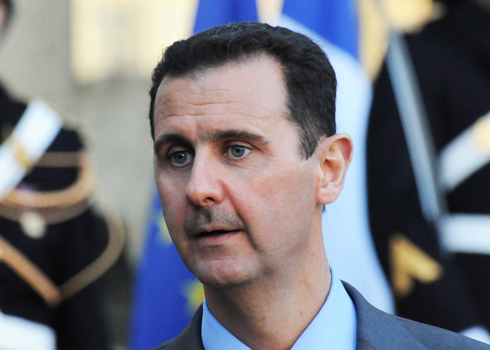The White House is strongly condemning the Syrian government’s attacks on its citizen-protesters with similar language it used against Libyan leader Muammar Qaddafi in the weeks and days leading up to U.S. air strikes in the North African country.
Noticeably absent from the denouncement, however, is any broad statement from President Obama or his staff that Syrian leader Bashar al-Assad has lost his “legitimacy” and must step down or be removed from power.
The White House is treading oh-so carefully on Syria and other Middle East uprisings in Yemen and Bahrain after the President’s comments that Qaddafi had “to go” — first uttered weeks ago — has led to confusion and consternation In Congress and throughout the country over whether Qaddafi’s removal, ousting or killing is the goal of U.S. and coalition military action in Libya, now in its seventh day.
Obama spokesman Jay Carney said Friday the United States is deeply troubled by Syria’s attempts to “repress and intimidate” its citizens into submission. Carney said the United States is consulting its allies throughout the Middle East as the situation develops in Syria and is urging the Syrian government to pursue a nonviolent path.
“The future of this region depends upon stability and depends on governments listening to their people,” Carney said, refusing to comment directly on whether Obama believes Asaad’s leadership is legitimate.
Syrian government troops Friday opened fire on protesters as security forces and opposition rebels repeatedly clashed in Damascus as the Middle East continued to feel the ripples of unrest unleashed first by Tunisian democracy movements last month. At least 24 people were killed in the city of Daraa, according to CNN.
The White House is still trying to respond to angry questions about the endgame in Libya, and whether the U.S. would be satisfied if Qaddafi stayed in power as long as he was no longer waging war against rebel forces in the country.
“That’s a question that depends on Qaddafi’s decision to use force and violence against the people of Libya,” Carney said. “The mission of the military coalition authorized by the United Nation is to protect civilians. That mission continues as long as civilians are threatened by Qaddafi’s forces.”
Obama spoke to congressional leaders Friday afternoon to address criticism from both sides of the aisle about his lack of consultation with them before launching air strikes against Qaddafi’s troops in Libya. Speaker John Boehner (R-OH) has been particularly harsh, asking Obama to outline his plans for Qaddafi and asking whether the U.N. resolution authorizing coalition military force to avert a humanitarian crisis also grants the United States and its allies the right to take out the Libyan leader.
Secretary of State Hillary Clinton Thursday announced that the U.S. would hand off the lead role in the mission to NATO, which would take control of the mission. Both Clinton and the White House have been vague about the details of that transition and who would lead the coalition forces with the U.S. taking a diminished role.
Carney promised that Obama “very soon” would speak to the American people directly about all of his decisions regarding Libya, although he noted any such address would not occur Friday.






